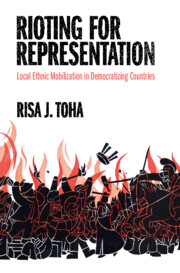Refine search
Actions for selected content:
10 results
Does Ethnopolitical Exclusion Cause Civil War Onset via Grievances? Evidence from 15 Case Studies
-
- Journal:
- Perspectives on Politics , First View
- Published online by Cambridge University Press:
- 14 November 2025, pp. 1-18
-
- Article
-
- You have access
- Open access
- HTML
- Export citation
7 - Channeling Frustration through Exit, Exclusion, and Engagement
-
- Book:
- Africa's Urban Youth
- Published online:
- 10 August 2023
- Print publication:
- 10 August 2023, pp 173-198
-
- Chapter
- Export citation
3 - The Demobilization of the Urban Margins
-
- Book:
- Mobilizing at the Urban Margins
- Published online:
- 25 May 2023
- Print publication:
- 08 June 2023, pp 93-123
-
- Chapter
- Export citation
2 - The Politics of Ethno-national Conflicts
- from Part I - Human Rights and Democracy in Deeply Divided Places
-
- Book:
- Collective Equality
- Published online:
- 20 April 2023
- Print publication:
- 27 April 2023, pp 43-72
-
- Chapter
- Export citation
3 - The Argument, Method, and Mechanisms
-
- Book:
- States and Nature
- Published online:
- 03 March 2022
- Print publication:
- 24 March 2022, pp 37-70
-
- Chapter
- Export citation
1 - Introduction
-
- Book:
- States and Nature
- Published online:
- 03 March 2022
- Print publication:
- 24 March 2022, pp 1-18
-
- Chapter
- Export citation
Analyzing The Risk Thresholds For Banning Political Parties After NPD II
-
- Journal:
- German Law Journal / Volume 23 / Issue 1 / February 2022
- Published online by Cambridge University Press:
- 10 February 2022, pp. 97-116
-
- Article
-
- You have access
- Open access
- HTML
- Export citation
Political exclusion and support for democratic innovations: evidence from a conjoint experiment on participatory budgeting
-
- Journal:
- Political Science Research and Methods / Volume 11 / Issue 4 / October 2023
- Published online by Cambridge University Press:
- 07 February 2022, pp. 947-955
-
- Article
-
- You have access
- Open access
- HTML
- Export citation
1 - Introduction
-
- Book:
- Rioting for Representation
- Published online:
- 28 October 2021
- Print publication:
- 04 November 2021, pp 1-11
-
- Chapter
- Export citation

Rioting for Representation
- Local Ethnic Mobilization in Democratizing Countries
-
- Published online:
- 28 October 2021
- Print publication:
- 04 November 2021
